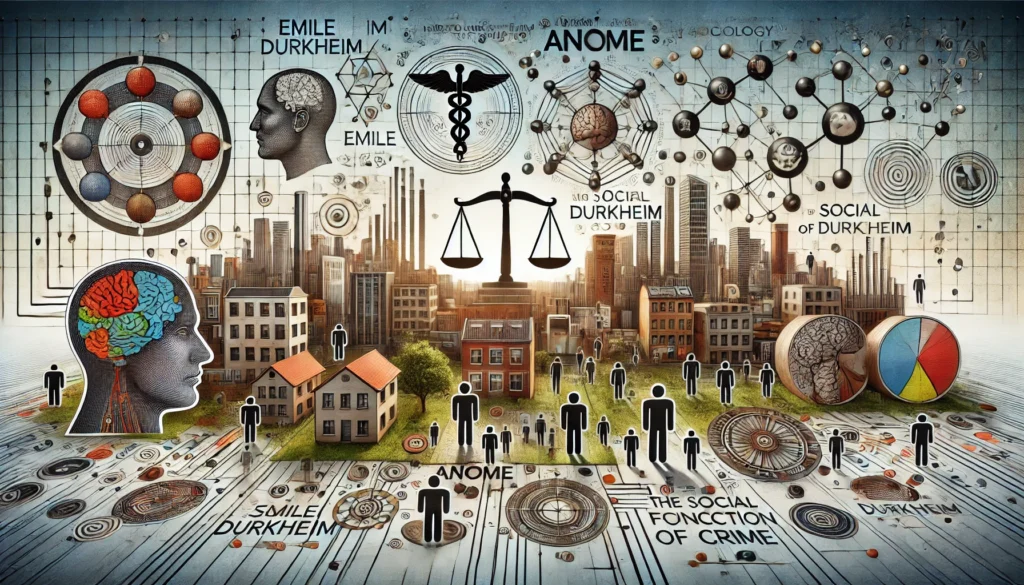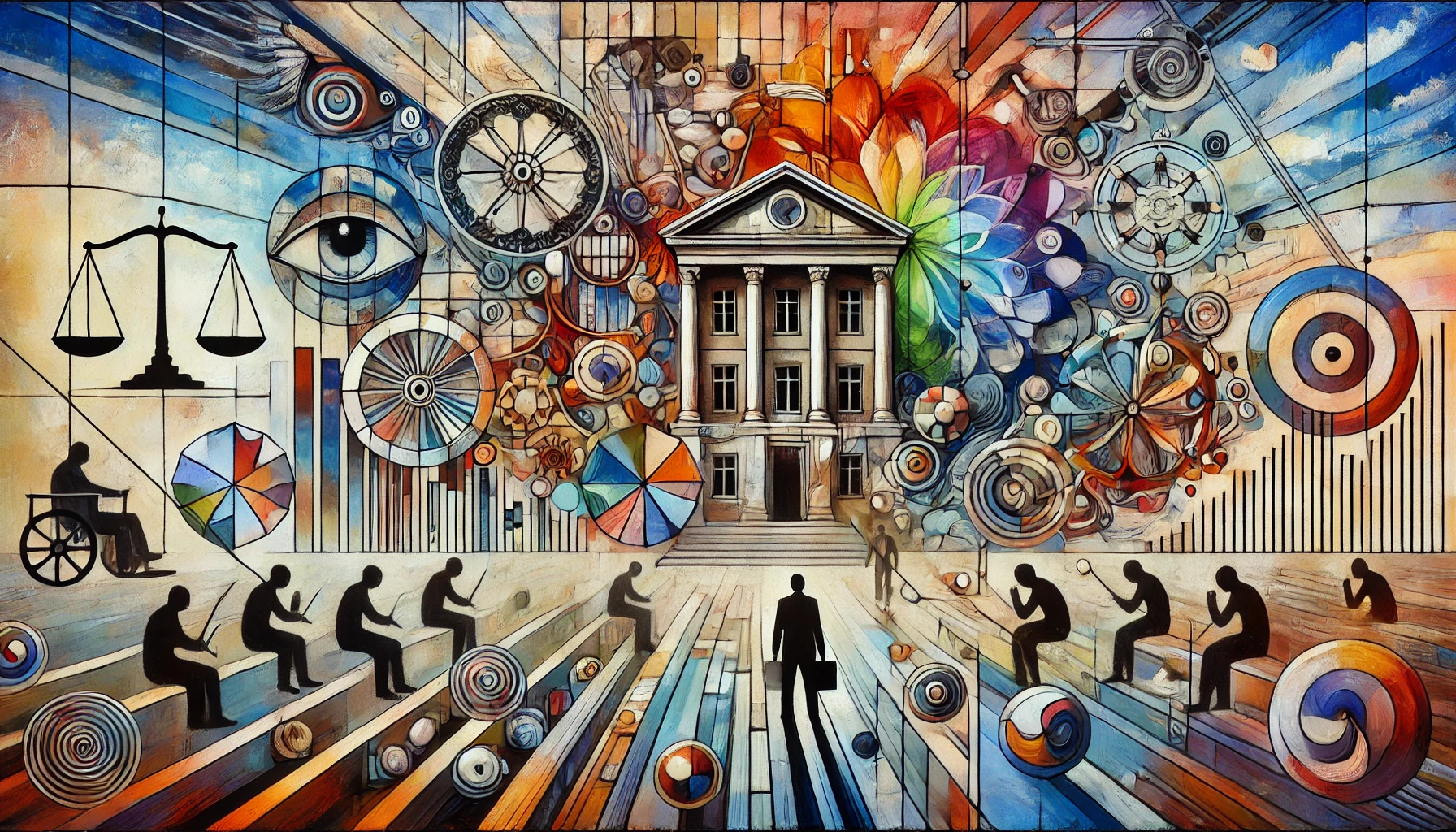The Social Function of Crime in Durkheim’s Criminology
Durkheim argued that crime serves a social function by reinforcing societal norms and encouraging collective reactions. Crime, in his view, is not merely an individual act of deviance but a phenomenon with societal roots. By punishing criminals, societies reaffirm their shared values, creating a sense of unity and solidarity. For example, public reactions to significant crimes often lead to strengthened laws and policies, showcasing the role of crime as a catalyst for social evolution.
Durkheim also believed that a society without crime is unattainable and potentially undesirable. Crime highlights societal boundaries, pushing communities to reflect on moral codes. This perspective has greatly influenced how criminologists view the interplay between societal norms and deviance, emphasizing the importance of crime in shaping and reshaping social order.
Anomie Theory in Criminology: Understanding Durkheim’s Perspective
Durkheim’s theory of anomie is one of his most significant contributions to criminology. Anomie describes a state of normlessness that arises when societal expectations and individual behaviors are misaligned. This condition often occurs during periods of rapid social or economic change, where traditional norms no longer apply, and new ones have not yet formed.
Durkheim illustrated this concept using industrialization as an example. As societies transitioned from agrarian economies to industrial ones, many individuals experienced alienation and confusion, leading to higher rates of crime and deviance. He posited that anomie disrupts the balance between societal regulation and individual desires, fostering conditions for criminal behavior.
Modern criminologists continue to apply Durkheim’s anomie theory to explain various phenomena, from urban crime rates to the effects of economic inequality. It provides a framework for understanding how macro-level societal changes impact individual behaviors, making it a cornerstone in the study of criminology.
Deviance and Durkheim: A Sociological Insight
Durkheim’s exploration of deviance is deeply rooted in his understanding of societal structures. He argued that deviance is not only inevitable but also necessary for social progress. By challenging existing norms, deviant behaviors encourage societies to adapt and evolve.
For instance, historical figures who initially broke societal norms—such as abolitionists or suffragettes—were considered deviant in their time. However, their actions eventually led to profound social changes. Durkheim’s perspective underscores the dynamic relationship between deviance and societal advancement.
Moreover, Durkheim highlighted the collective response to deviance as a means of reinforcing social cohesion. Public reactions to deviance often unify communities against perceived threats to their shared values. This idea has influenced contemporary theories on restorative justice, which focus on repairing the harm caused by deviance rather than merely punishing the deviant.
Durkheim’s Influence on Modern Criminology: The Legacy of Anomie and Social Function
The impact of Durkheim’s ideas on modern criminology cannot be overstated. His theories laid the groundwork for numerous sociological studies on crime, inspiring researchers to examine the structural and cultural contexts of criminal behavior.
For example, Robert K. Merton expanded on Durkheim’s concept of anomie to develop his strain theory, which explains how societal pressures contribute to deviant behaviors. Similarly, modern studies on urban crime often draw on Durkheim’s insights into the relationship between societal breakdowns and increased deviance.
Durkheim’s emphasis on the social function of crime has also shaped policy-making. Programs aimed at community rehabilitation and crime prevention often incorporate his idea that crime reflects broader societal issues. By addressing underlying social problems—such as poverty or lack of education—policy-makers can reduce crime rates more effectively.

Critiques of Durkheim’s Criminological Theories
While Durkheim’s contributions to criminology are profound, his theories have not been without criticism. Some scholars argue that his emphasis on societal structures overlooks individual agency. Critics suggest that by focusing on collective phenomena, Durkheim fails to account for the personal motivations and psychological factors that drive criminal behavior.
Additionally, Durkheim’s notion of anomie has been criticized for its ambiguity. While it effectively describes the disconnect between societal norms and individual actions, its application in empirical research has faced challenges. Some researchers argue that the concept is too broad to offer precise predictive power.
Despite these critiques, Durkheim’s theories remain a vital part of criminological discourse. They continue to inspire debate and innovation, ensuring his legacy endures in the study of crime and society.
The Relevance of Durkheim’s Theories Today
In today’s rapidly changing world, Durkheim’s insights into crime and society are more relevant than ever. Globalization, technological advancements, and economic upheavals have created new forms of anomie, challenging traditional norms and regulations. Understanding these changes through Durkheim’s lens allows criminologists to develop strategies for mitigating their impact on crime rates.
Furthermore, his emphasis on the social function of crime offers valuable lessons for contemporary justice systems. Restorative justice practices, which focus on repairing harm and rebuilding community trust, align closely with Durkheim’s views on the collective response to deviance.
As societies continue to evolve, Durkheim’s work provides a timeless framework for understanding the complex relationship between crime, deviance, and social order. His contributions to criminology serve as a foundation for ongoing research, shaping the way we address the challenges of crime in an ever-changing world.
How does Durkheim’s sociology relate to modern criminology?

